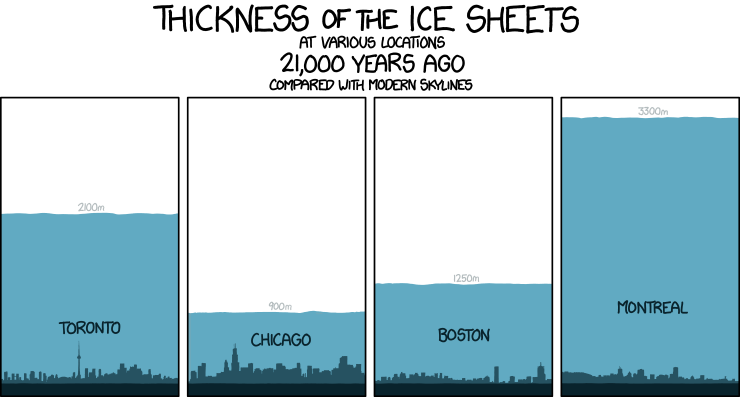Ice sheets are beautifully complex systems, but it's easy to think of ice sheets and the environment as a one-way relationship: the environment changes, then the ice changes -- environment to ice. But ice sheets have an influence on the environment just as strongly as the environment has an influence on them. This post will talk about an interaction that I have been obsessed with (and nerding out over) recently: glacial isostatic adjustment (GIA, for short).
Imagine the most comfortable bed you can possibly sleep on. The type of mattress that you just sink in to and is the hardest goodbye on a Monday morning. Glacial isostatic adjustment is like that, but a several-kilometer thick ice sheet is you, and your mattress is the Earth's mantle.
When you lie down on a mattress, you exert your weight on that mattress -- compressing the inside of your beloved foam rectangular prism -- causing the surface on which you rest to sink. Ice sheets on continents are doing the same thing, just on a larger scale. Ice sheets are big. And, as you would expect from that detail, they are also very heavy. So heavy, in fact, that they weigh down the upper mantle beneath them. This causes the ground to subside.
 |
| "Thickness of the Ice Sheets" - xkcd comic |
The Earth's mantle is deformable, and we can think of the mantle as having a viscosity. Viscosity is the measure of how resistant a substance is to deformation. A substance that is very resistant to deformation is described as having a high viscosity, while low viscosity fluids are less resistant to deformation.
When falling onto your mattress after a long day, think about how far you sink into it, and how quickly. If it's fast, that mattress isn't effectively resisting your force. For the load of an ice sheet, this would mean the mantle below has a low viscosity. The mantle quickly adjusts to the stress applied by the ice sheet. Alternatively, if you slowly sink into your mattress, that's like an ice sheet above a high viscosity mantle. The adjustment is slow.
Your alarm blares, and now you have to get up and get ready for the day ahead of you. You muster up the courage to sit up, then get off your bed completely ... just slowly. Depending on the type of mattress you have, it will rebound as you get up at varying speeds. Memory foam mattresses rebound slowly. Very slowly. Other mattresses might rebound quickly, maybe a second or two after getting up. For an ice sheet (or lack thereof), this is called post-glacial rebound.
Some Sources:
ICE5G-D:
- Peltier, W. R., R. Drummond, and K. Roy (2012), Comment on “Ocean mass from GRACE GRACE and glacial isostatic adjustment” by D. P. Chambers et al., J. Geophys. Res., 117, B11403, doi:10.1029/2011JB008967.
- Peltier, W.R., 2004. Global Glacial Isostasy and the Surface of the Ice-Age Earth: The ICE-5G(VM2) model and GRACE, Ann. Rev. Earth Planet. Sci., 32, 111-149.
- A, G., J. Wahr, and S. Zhong (2013) "Computations of the viscoelastic response of a 3-D compressible Earth to surface loading: an application to Glacial Isostatic Adjustment in Antarctica and Canada", Geophys. J. Int., 192, 557–572, doi: 10.1093/gji/ggs030.
ICE6G-D:
- Peltier, W.R., Argus, D.F. and Drummond, R. (2018) Comment on "An Assessment of the ICE-6G_C (VM5a) Glacial Isostatic Adjustment Model" by Purcell et al. J. Geophys. Res. Solid Earth, 123, 2019-2018, doi:10.1002/2016JB013844.
Caron-2018:
- Caron, L., Ivins, E. R., Larour, E., Adhikari, S., Nilsson, J., & Blewitt, G. (2018). GIA model statistics for GRACE hydrology, cryosphere, and ocean science. Geophysical Research Letters, 45, 2203–2212. https://doi.org/10.1002/2017GL076644
.jpeg)



